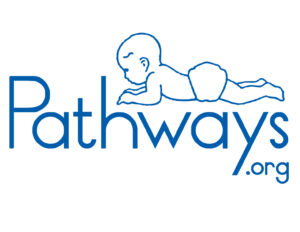 Pathways.org provides a host of free resources to assist parents in understanding and encouraging their baby’s development to catch delays early on. This week we’re highlighting the Social-Emotional section on the Pathways.org site, which offers useful definitions, answers to questions parents may have, and a thorough chart of milestones from birth to age three (and on into the preschool years). Tips for parents to try out as well as links to brief articles on a variety of social-emotional topics are also included along with a one-minute video and an infographic. The authors also provide links to a brochure on social-emotional development available in English, Spanish, Hindi, Italian, Oriya, Persian, and Turkish.
Pathways.org provides a host of free resources to assist parents in understanding and encouraging their baby’s development to catch delays early on. This week we’re highlighting the Social-Emotional section on the Pathways.org site, which offers useful definitions, answers to questions parents may have, and a thorough chart of milestones from birth to age three (and on into the preschool years). Tips for parents to try out as well as links to brief articles on a variety of social-emotional topics are also included along with a one-minute video and an infographic. The authors also provide links to a brochure on social-emotional development available in English, Spanish, Hindi, Italian, Oriya, Persian, and Turkish.
Check it out. You’ll be glad you did!
The ICC-Recommended Early Start Personnel Manual (ESPM) describes core knowledge and role-specific competencies needed for early intervention service provision, incorporating current research and evidence in the field of early intervention. Access the ESPM here.
This resource is related to the following ESPM knowledge-level competencies:
- Core Knowledge (CK):
- CK6: The sequences of development and the interrelationships among developmental areas/factors, including social and emotional development and resiliency, including the development of attachment, trust, and self-regulation.
- Evaluation and Assessment (EA):
- EA4 (EIS): Knows strategies that support parents/caregivers in identifying and articulating their concerns about their infant/toddler’s development and needs.
- Individualized Family Service Plan Development and Review (IFSP-DR):
- IFSP-DR5 (EIS): Understands the rationale for the identification and selection of intervention strategies used in everyday routines, relationships, activities, places, and partnerships for early intervention activities.
- Individualized Family Service Plan Development and Review (IFSP-i):
- IFSP-i2 (EIS): Understands the individual nature of child learning styles and the importance of adapting intervention strategies.
- IFSP-i6 (EIS): Understands the need for developmentally appropriate strategies (for example, hands-on, experiential, child-centered, play-based activities within daily routines), adaptations, assistive technologies, and other supports that maximize the child’s learning opportunities.
- IFSP-i11 (EIS): Knows strategies that support parents in adapting the natural environment to meet infant/toddler developmental needs.
